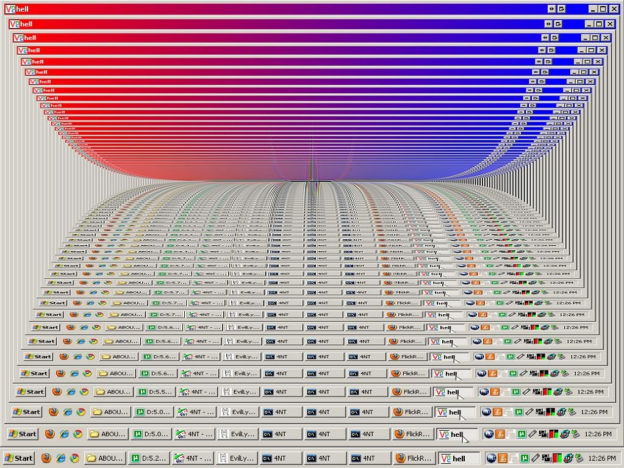When does an iteration become an aberration? That’s the question I’ve been struggling with for the past few months.
Aberration is defined as a departure from what is normal, usual, or expected – typically one that is unwelcome. An aberration is something strange that rarely occurs, for example when the thermometer tops 90 degrees in January in Minnesota. Although, given the acceleration of climate change, that may turn out to be more of an iteration than an aberration.
Technically, an aberration might be considered as something that occurs beyond 3 Standard Deviations from the mean. That’s why H. L. Mencken said that “human progress is furthered, not by conformity, but by aberration.” By definition, change does not happen within the Bell Curve. It happens at the margins. Aberrations can be for better or for worse.
An iteration involves the repetition of a process or action with the intent of achieving a specific goal or outcome. For example, a scientist might perform an experiment multiple times to test a hypothesis or a student might practice a math problem repeatedly to improve skills.
In my last post, I wrote about the iterative evolution of machine learning that has now reached the stage of robots being able to generate coherent (if not accurate) responses to practically any question or create a picture simply by having a human state an image, for example a suitcase that drives or a car that flies.
At a recent conference I attended at Harvard, a leading-edge software engineer discussed the evolution of machine learning, optimization, and transfer. Over the past month, I’ve been reflecting how humans stack up now on those three variables given the recent advances in AI. Here’s a chart to summarize that idea:
|
Functions: |
Iterative path for humans |
Iterative path for AI Robots |
|
Learning |
Narrow and shallow |
Broad and deep |
|
Optimization |
Closed and rigid |
Open and agile |
|
Transference |
Provincial and traditional |
Adaptive and generative |
Learning means exploring multiple sources of information and rigorously analyzing it. Optimization means understanding how we need to continuously improve our responses based on feedback grounded in statistical probability. Transference means applying the knowledge and skill applied to solve a particular problem to many other complex situations, i.e. become more adaptive and generative. AI has claimed an advantage on the first two, but humans still hold a commanding lead on the third. We will see how that changes over time.
I don’t know about you, but it seems to me that humans are trending in the direction of becoming more narrow, shallow, closed, rigid, provincial and traditional; while AI robots are evolving to become, broad, deep, open, agile, adaptive and generative. The iterations are on a collision course. At what point do these iterations culminate in an aberration, i.e. robots take control. In order to solve the complex problems of our world, we need to engage in deep learning, creative optimization, and adaptive transference. Given the trend lines on which humans and robots are currently embarking, predictions for the future become bleak – an aberration may be possible.
Here are some questions to help you decide if the changes we are seeing are iterations or aberrations:
- Is police violence an iteration or an aberration?
- Is ISIS an iteration or an aberration?
- Are China’s ambitions and authoritarian policies an iteration or an aberration?
- Are diseases an iteration or an aberration, for example: COVID, Leukemia, etc.?
- Are the post-World War II conflicts iterations or aberrations?
- Are North Korea, Iran, China, and Russia examples of iterations or aberrations?
- Is the current republican party an iteration or an aberration?
- Are geniuses who are 4 Standard Deviations from the mean iterations or aberrations?
- Are climate disasters iterations or an aberrations?
- Is the human race an iteration or an aberration?
Perhaps stepping back in time will help to answer those questions, particularly the last one.
- About 14 billion years ago, the universe was created.
- About 4 billion years ago, the earth was formed.
- About 1 billion years ago, the first single-celled organisms appeared.
- About 10 million years ago, the first form of human (more ape than human) appeared.
- About 3 million years ago, the first human-like footprint was discovered.
- About 300,000 years ago, the first homo-sapiens appeared – humans who stood erect and used tools.
Given that history, one might conclude that modern humans have been evolving over a 300,000 year period by constantly developing adaptive and generative skills as well as continually improving their use of tools. One might also conclude that, given the small percentage of time humans have occupied this earth (less than 1/1,000th of the time earth was formed), that humans may very well be the aberration. Bluntly, we may be a divergent anomaly and glitch – an aberration – in earth’s history. We are clearly the first species on the planet to be hell-bent on destroying it.
Taking into account all that history and evolution as context, it may be easier to understand what is happening in our current political context. As a fun example, think about the Sarah Palin phenomenon. Like a COVID-evolving variant, Sarah Palin channeled her emotional fervor into the Tea Party movement, which iterated into the Freedom Caucus, which iterated into MAGA Trumpism, which iterated into the January 6 insurrection, and culminated in last week’s craziness in the selection of Kevin McCarthy as House Speaker. We saw nationalism morph into nihilism. We saw a government’s constitutional responsibility to find solutions to our existential crises degrade into a spectacle of outrageous acts. Given the fact that there were similar crises in 1856 and 1923, this spectacle seems more like an iteration than an aberration. Time will tell.
In a brilliant conversation between David Brooks and Bret Stephens in the NYT on January 11, 2023, they discussed the evolution of the Republican party and their respective roles in it. Brett Stephens suggested that the party has shifted from innovation to imitation to idiocy. I’m not sure about the intentions of the people driving this shift, but it seems to me that it represents a perfect illustration of when an iteration becomes an aberration.
I’ve been struggling with where the world is heading. I keep hoping that the struggle is just an iterative process that will help us evolve as a caring community and a compassionate civilization, but I’m having a hard time finding evidence to support that hope. I hope with all my heart, however, that the course we are on is iterative, evolving in a positive direction, and will lead to a better life for all. I fear, however, that humans are an aberration on this planet and that AI Robots may someday take over where we left off. May it not be so.
It seems to me that our only chance of avoiding that aberration is to reverse the human trend line, i.e. become broader, deeper, open, agile, adaptive, generative and responsive. Perhaps we should all hope that future aberrations will be for better and not for worse. Or even a little Iteration in the right direction with the right intentions. May it be so.
Also published on Medium.




You’re the man Ricky! Thank you once again. Forgive my pessimism but I’m glad to be 76 and not 26.